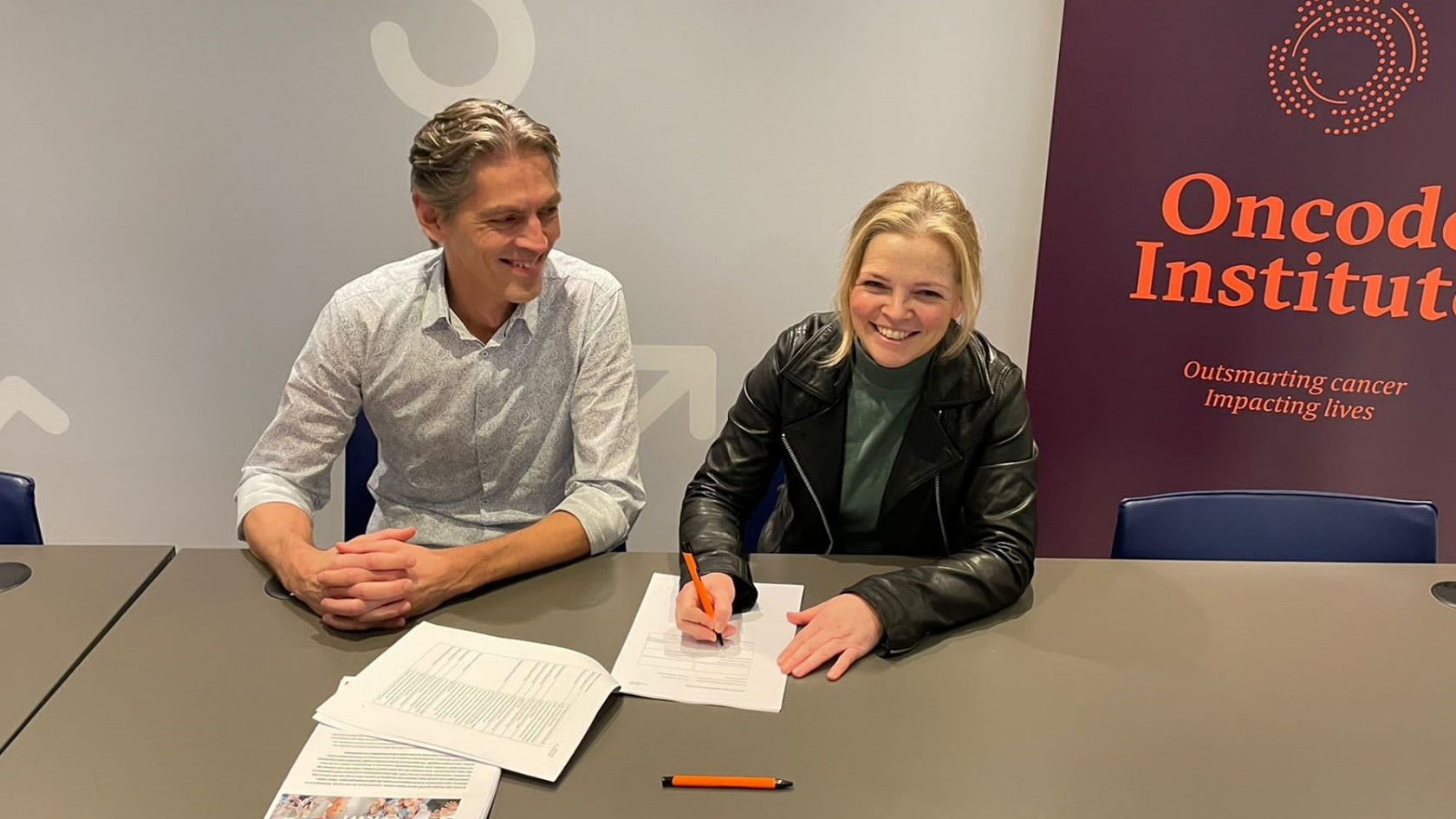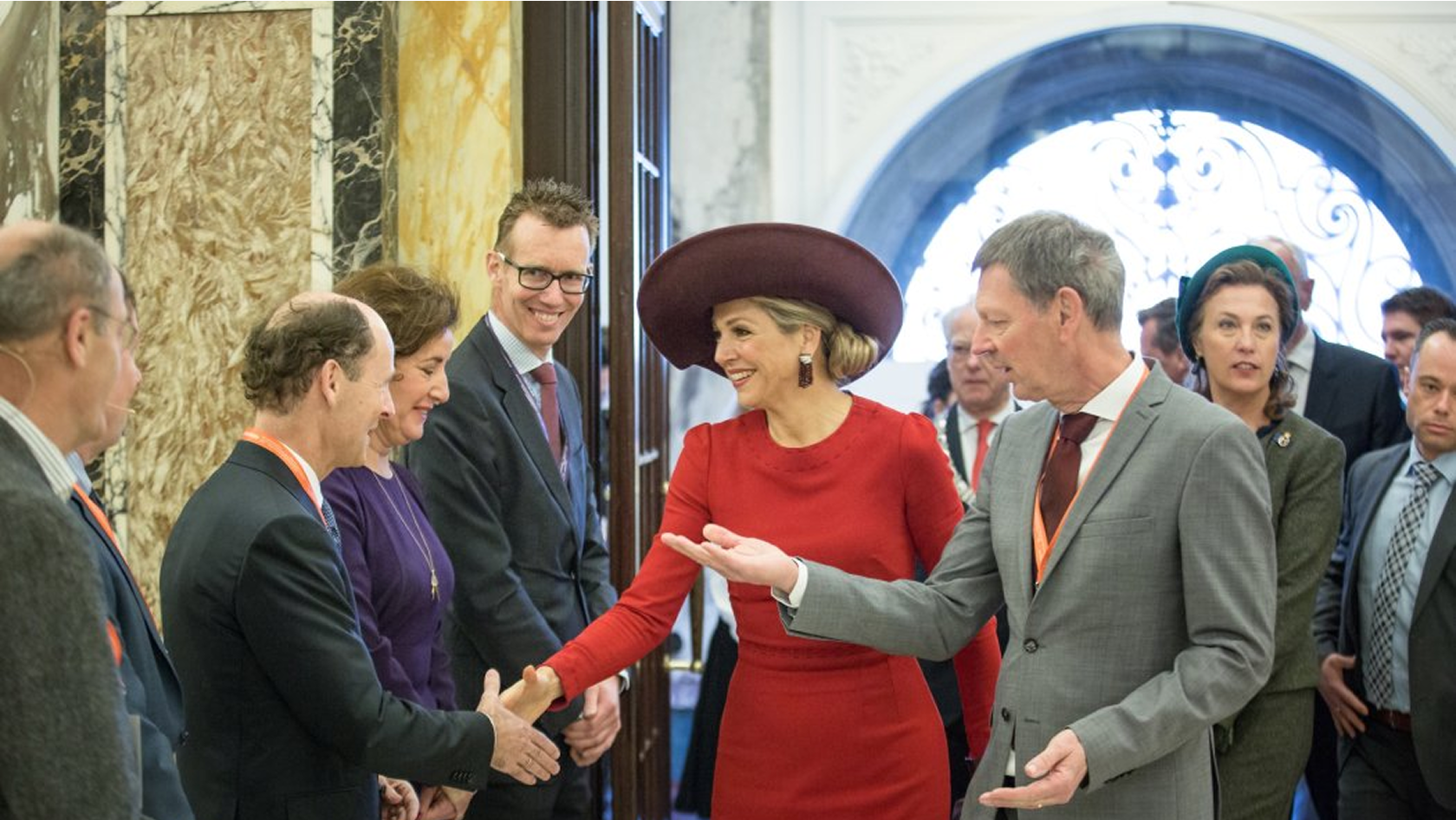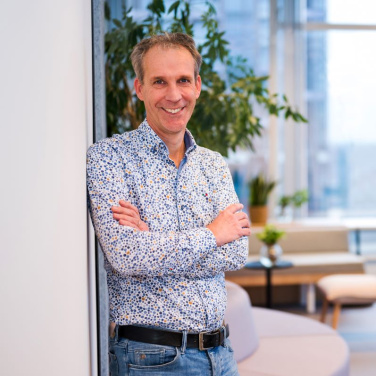Our Story
How Oncode Institute Began
The Netherlands is home to many leading cancer researchers. Yet, translating scientific breakthroughs into real-world benefits often took too long to have a genuine impact on people’s lives. Talent was abundant, but collaboration across institutions was limited, and the research landscape remained fragmented. Without the right structure, promising discoveries risked being lost. That needed to change.
Oncode Institute emerged from a shared vision of changing exactly that, and placing connection and collaboration at the heart of cancer research. By redesigning the approach, we ensure fundamental research reaches the people who need it - faster.

KWF director Carla van Gils signs the agreement

Her Majesty the Queen Máxima, General Director Ton Rijnders, Robbert-Jan Stegeman, Minister Ingrid van Engelshoven and co-initiator Réne Kuijten – Photo by Bas Uterwijk for Oncode Institute

KWF director Carla van Gils signs the agreement
Launched in early 2017, Oncode Institute was the result of a national, collective effort. Leading cancer scientists, healthcare experts and policymakers came together - supported by the Dutch government. The founding partners - KWF Dutch Cancer Society, the Ministries of Economic Affairs & Climate (EZK), Health, Welfare & Sport (VWS), Education, Culture & Science (OCW), ZonMw, and Topsector Life Sciences & Health - shared one vision: an institute without walls, uniting the brightest minds in oncology to outsmart cancer together.

Her Majesty the Queen Máxima, General Director Ton Rijnders, Robbert-Jan Stegeman, Minister Ingrid van Engelshoven and co-initiator Réne Kuijten – Photo by Bas Uterwijk for Oncode Institute
On 5 February 2018, Her Majesty Queen Máxima officially launched Oncode Institute. During the ceremony in Amsterdam, she swiped an orange dot across a screen, connecting it to many others. This act was a powerful illustration of what Oncode Institute stands for - a growing network of collaboration, innovation and hope.
That day, cancer patient and advocate Robbert-Jan Stegeman reminded us why Oncode Institute exists. He did not speak as a researcher, but as someone hoping for better options:
“Behind every discovery is a real person waiting for hope.”
This message continues to guide us and our work.
2023: A New Phase - A Renewed Commitment
In 2023, Oncode Institute entered a new chapter - marked by renewed ambition and trust. The continued support and funding from our key partners - KWF Dutch Cancer Society, Topsector Life Sciences & Health, ZonMw and the ministries of EZK, VWS and OCW - ensures we can continue to empower researchers, support bold ideas and strengthen the bridge between science and patient care.
As KWF Director Carla van Gils said: ‘The journey from the first idea in a lab to a treatment for a patient is long and challenging. Oncode Institute unites the best researchers and valorisation experts to accelerate this process - creating new treatments for the patients of the future.’
2012 - 2023
Our Journey So Far: A Timeline of Progress
2012 - A Bold Idea
René Kuijten (Topsector Life Sciences & Health) and Rudy Dekeyser (VIB) pioneer a new model for cancer research: uniting top scientists, supporting valorisation from the start and ensuring long-term funding.
2015 – Support Gathers Momentum
The Dutch government, KWF and Topsector Life Sciences & Health sign a Memorandum of Understanding, formalising the idea into a shared national ambition.
2016 – Foundations Are Laid
KWF launches Onco Research to prepare for the future institute. Leading scientists present their vision on national television, sparking a public conversation.
2017 – Oncode Institute Is Born
Oncode Institute is officially incorporated. Partner institutions and funders commit, laying the foundation for lasting collaboration.
5 February 2018 – Official Launch
Her Majesty Queen Máxima launches Oncode Institute. Linking digital dots becomes a lasting metaphor for connecting science, people and purpose - from this moment forward.
2018–2023 – Results That Matter
During our first five years, Oncode Institute supported researchers in achieving:
- 1,681 scientific publications - advancing knowledge and understanding of cancer
- 110+ patent applications - protecting innovations that could become tomorrow’s treatments
- 9 spin-offs - translating discoveries into new companies driving innovation
- 16 clinical proof-of-concept studies - moving promising research closer to actual patient care
Researchers received not only funding, but also expert guidance in intellectual property, technology transfer and valorisation - helping discoveries move faster from laboratory to life.
2023 – Renewed Commitment
With new investment from our funders, Oncode Institute enters its next five years. This renewed commitment reflects our partners’ belief in the power of fundamental research and our unique role in connecting science and patient care.
AFTER 2023
Oncode Institute continues to make tangible progress in its mission to outsmart cancer. With a unique combination of excellent science, intensive collaboration and proactive valorisation, we are accelerating the translation of fundamental discoveries into applications that positively impact patients and society.
Scientific Breakthroughs To Date
Our research community grew with ten new Junior Investigators across ten partner institutes, expanding our network from 52 to 62 teams. This growth strengthened the community’s knowledge base, enabling fundamental insights to reach clinical applications.
By the end of 2024, Oncode Investigators had published hundreds of articles and raised €66.9 million in external research funding. Many publications ranked among the top 10% most cited oncology publications worldwide.
Thanks to our funding programmes - like our Base Research Funding and the Clinical Proof-of-Concept (CPoC) programme, Oncode Investigators were able to launch innovative clinical projects and achieve early clinical results. For example, Oncode Investigator Jacco van Rheenen and his colleagues conducted research on how the menstrual cycle affects the effectiveness of chemotherapy in mice. The results of this fundamental research now form the basis for a clinical trial. A striking example of bridging fundamental research and patient care.
Valorisation and Economic Impact So Far
Oncode Institute filed a record-breaking 25 new patent applications and 47 new invention registrations. Intellectual property (IP) rights for nine inventions were licensed, and six new technology development projects were launched. Several spin-offs, including Laigo Bio, Flindr Therapeutics and Cell Control, raised millions of euros in investment. New companies sCellGen and Polar Oncology were established through the Oncology Bridge Fund. Every euro invested through this fund generates an average of 14 euros in follow-on investment, creating dozens of new jobs in the biotech sector. Meanwhile collaboration between Oncode Accelerator and Cancer Research Horizons further strengthened international cooperation in expertise and innovation.
Health and Patient-Centred Innovation
Through our seminar programme, Oncode Institute strengthened the connection between research and patient care, including between gastrointestinal cancer research and innovative clinical development projects - moving discoveries closer to patients. When evaluating new clinical projects, Oncode’s Patient Participation Programme team actively collaborated with patient representatives, making research proposals more responsive to patients’ needs. A telling example is Oncode Investigator Jeroen de Ridder’s work developing an artificial intelligence (AI) driven solution called Sturgeon. This AI driven solution enables rapid identification of different types of central nervous system tumours prior to surgery - ultimately improving patient outcomes.